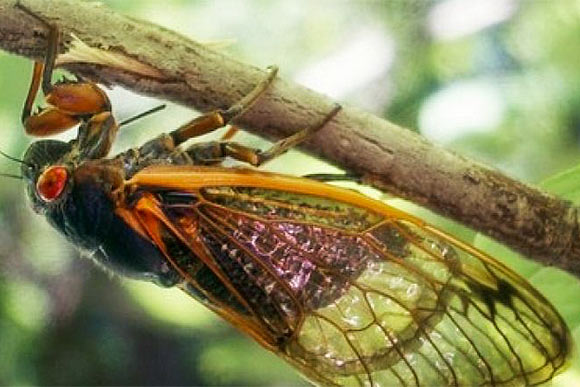Metroparks a-buzz over cicada emergence

Parts of eastern Ohio will be abuzz for the next couple of months with the emergence of the 17-year periodical cicadas. Cleveland Metroparks is using this rare opportunity to educate the public about a mysterious, yet harmless insect.
"We want our neighbors to join us and understand how this organism survives and thrives," says Mark Warman, an education specialist at the West Creek Reservation.
April's warm temperatures will hasten cicada activity by mid-May, says Warman. The park system's cicada-related programming begins May 10 at West Creek with a primer about the creatures' life cycle. Additional events scheduled through the end of June include nature walks and a birding/cicada expedition on Hinckley Lake.
 Mark WarmanNaturalists view the cicada invasion as a cause for celebration rather than concern. While the insects can be noisy in large numbers, they don't sting or bite. Nor are they bent on destroying crops or gardens in some biblical plant Armageddon. Cicadas can cause branches to fall off through egg-laying, but this is not harmful to mature trees, says Warman.
Mark WarmanNaturalists view the cicada invasion as a cause for celebration rather than concern. While the insects can be noisy in large numbers, they don't sting or bite. Nor are they bent on destroying crops or gardens in some biblical plant Armageddon. Cicadas can cause branches to fall off through egg-laying, but this is not harmful to mature trees, says Warman.
Periodical cicadas are expected to emerge in parts of Ohio, Pennsylvania, Virginia, West Virginia, Maryland and Long Island, NY. Unlike their greenish-black cousins that appear each summer with a "ch-ch-ch" sound, the 17-year cicada is black and orange and makes a continuous buzzing noise.
This year's crop started life as eggs in 1999. After hatching, the rice-sized nymphs spent the past 17 years underground sucking nutrient-rich fluids from tree roots. The winged adults emerge for three to five weeks to mate and feed on plant juices. Females will then lay hundreds of eggs in tree branches, beginning the cycle anew.
While it's unknown where heavier pockets of Northeast Ohio cicada activity will be, the public can help by sending tweets and Instagram posts regarding larger swarms. Metroparks is asking would-be citizen scientists to report sightings with the hashtags #cicadas2016 and #broodV, the latter of which designates the number of cicada swarms recorded since 1948.
Ultimately, the phenomenon is a chance for people to learn about a misunderstood insect that means humanity no harm, Warman says.
"It's a reminder that the earth was wild at one time," he says. "It's going to be a neat thing for people to experience."
The Cleveland Metroparks is part of Fresh Water's underwriting network.

